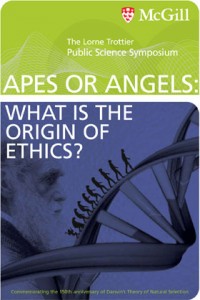Pop quiz. 1) What are good and evil? 2) Where do they come from? Please answer in 25 words or less.
Couldn’t do it? Don’t feel badly. Countless philosophers, prophets, saints, scientists, mystics, jurists, artists and authors have struggled for millennia with these most basic questions of existence. None have ever come to a conclusion that was acceptable to more than a tiny fraction of the rest of humanity. But that certainly hasn’t stopped us from trying.
McGill University proudly adds its voice to this eternal conversation with Apes or Angels: What Is the Origin of Ethics?, the 2008 Lorne Trottier Public Science Symposium, on Thursday, Nov. 6. Planned in honour of the 150th anniversary of the publication of Charles Darwin’s landmark Theory of Natural Selection, the symposium brings together a stellar panel of international experts from the fields of evolutionary biology and economics, including Professor Theodore Bergstrom, Aaron and Cherie Raznick Chair of Economics, UC Santa Barbara; Professor Manfred Milinski, Executive Director, Max-Planck-Institute for Evolutionary Biology, Plön, Germany; Professor Paul Seabright, Professor of Economics, University of Toulouse, France; and Professor Stuart West, Professor of Evolutionary Biology, Edinburgh University. Moderating the debate will be Professor Graham Bell, James McGill Professor and an evolutionary biologist, Department of Biology.
The panel will debate the hottest hot button questions in the field of ethics: Are humans intrinsically good or are we forever motivated only by self-interest? Does ethical behaviour have an evolutionary basis or is it something we have learned through culture and civilization?
“The debate on the origin of ethics at this juncture is extremely timely because Darwin’s influence on the question was profound,” said Brian Alters, Director of the Evolution Education Research Centre in the Faculty of Science. “And when he reframed the debate about the origins of life, he also indirectly reframed the question of where good and evil originate.”
The Lorne Trottier Public Science Symposium Series is supported by the Trottier Family Foundation. The current symposium is the fourth in the ever-popular series of “Great Debates” in science and contemporary society.
Lorne Trottier, president and co-founder of Matrox Electronic Systems Ltd., funded the symposium as the realization of his vision of “a public forum to inform, inspire debate and raise public awareness on contemporary issues confronting society.” In addition, he has generously donated $23 million to McGill in recent years for construction of the Lorne Trottier Building in Information Technology, for two Lorne Trottier Chairs and for endowed fellowships in science and engineering.
What is the Origin of Ethics?, the 2008 Lorne Trottier Public Science Symposium, Thursday, Nov. 6, 5 – 7 p.m. Room 132 of the Stephen Leacock Building. Admission is free and open to the public, but seating is limited. Simultaneous French translation will be provided. The symposium will also be available on the Internet via delayed webcast.For more information, please see www.mcgill.ca/science/trottier-symposium/

